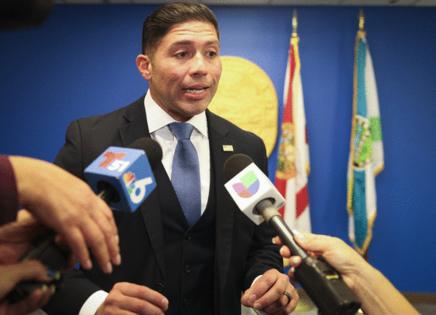Miami-Dade commission votes to remove fluoride from drinking water. Will mayor veto?
Published in News & Features
Miami-Dade must halt decades of adding fluoride to its drinking water under legislation that county commissioners approved Tuesday to end the anti-cavity program. But Mayor Daniella Levine Cava said she supports keeping fluoride in tap water and may veto the legislation, setting up a potential showdown over a national conservative movement linking fluoride to health concerns.
The legislation to end the county’s fluoridation program passed on an 8-2 vote, with a bipartisan coalition of commissioners backing the end of a practice that began in the 1950s.
Advocates say adding tiny amounts of fluoride to drinking water reduces cavities and oral infections in low-income households where regular use of fluoride toothpaste may be uncommon.
The health secretaries for Gov. Ron DeSantis and President Donald Trump both oppose adding fluoride to drinking water, with Florida Surgeon General Joseph Ladapo in the front row of the commission chambers Tuesday during the vote.
“Forced mass medication is an outdated concept,” said Commissioner Roberto Gonzalez, who sponsored the legislation set to end the addition of fluoride to county tap water within 30 days. “The choice before us is not about politics. It’s about prudence.”
The legislation ending a fluoridation program that began seven decades ago did not go through the commission’s typical process, making Tuesday’s vote the first time commissioners had a chance to debate the Gonzalez proposal. Normally, proposed legislation is first voted on in one of the County Commission’s committees, which are made up of a smaller group of county commissioners, before going to the full 13-member body.
Gonzalez, a Republican who is chair of the Health and Safety Committee, did hold a hearing about fluoride at the committee’s meeting last month. But that was days before the legislation that passed Tuesday became public through the commission’s agenda system.
No fluoride advocates were invited to speak at that March 11 committee hearing. At Tuesday’s meeting of the full County Commission, dentists against the legislation were given 60 seconds each to address commissioners during the public comments portion of the meeting, when any members of the public may speak.
“One minute is not enough to talk about all the benefits of fluoride,” Dr. Richard Mufson, an Aventura dentist, told commissioners. “You’re going to hear a lot of information that is not accurate.”
The legislation will go into effect unless the mayor vetoes it within the next 10 days. Nine votes are needed to override a mayor’s veto, giving Levine Cava, a Democrat, the power to keep fluoride in tap water, barring a shift in support. Asked in the morning if she would veto the Gonzalez legislation if it passed, Levine Cava said: “I will definitely consider it.”
She left the meeting before the vote.
Voting to end the fluoride program on the officially nonpartisan board were five Republicans — Chair Anthony Rodriguez and Commissioners Kevin Cabrera, Roberto Gonzalez, Juan Carlos Bermudez and Rene Garcia — and three Democrats — Danielle Cohen Higgins, Kionne McGhee and Oliver Gilbert. Voting against were a Democrat, Eileen Higgins, and a Republican, Raquel Regalado.
“This is a decision that hurts the most vulnerable,” Higgins said after the vote.
Three Democratic commissioners — Marleine Bastien, Keon Hardemon and Micky Steinberg — were not present for the vote. Gonzalez would need one of those commissioners to side with him to override a veto.
Regalado had urged commissioners to delay Tuesday’s vote until they had a chance to hear a detailed presentation on the science behind fluoridation.
“We need to have a conversation where both sides are represented,” Regalado said.
The debate over fluoride easily brought the most tense moments of the day as Gonzalez and Regalado sparred over the issue. When Gonzalez interrupted Regalado at one point, she responded: “You have disrespected me enough for one day.”
Commissioners faced a mostly anti-fluoride crowd on Tuesday. Speakers during the public comment portion included some of the advocates from outside of Miami-Dade who have successfully persuaded other Florida governments to end their fluoridation programs.
“Water is to hydrate, not to medicate,” said Jay Kolhagen, a resident of Naples, which stopped adding fluoride to tap water last year.
Levine Cava declined to be part of the discussion, having her deputy in charge of the water supply, Roy Coley, address commissioners. Coley, a former director of Miami-Dade’s Water and Sewer Department who now oversees that agency and other departments, said the county adds fluoride to tap water because that’s what major medical and public health groups continue to recommend.
“We don’t claim to be the owners of the science of the wisdom of fluoridation,” Coley said. “We follow the guidance.”
Major medical groups, including the American Academy of Pediatrics, continue to endorse adding tiny amounts of fluoride to tap water as a way to ensure children receive at least a small amount of fluoride on a regular basis.
Ladapo and others advocating for an end to fluoride in drinking water have pointed to studies linking fluoride consumption to early-development issues with children, including lower IQ levels. They contend the practice is based on outdated science and ignores the ready access to toothpaste that will keep teeth healthy without people having to drink tiny amounts of fluoride too.
“Either all of the research is wrong,” Ladapo said as the only speaker invited to address commissioners during the debate, “or you’re comfortable potentially harming some very special populations in your community.”
_____
©2025 Miami Herald. Visit miamiherald.com. Distributed by Tribune Content Agency, LLC.







Comments